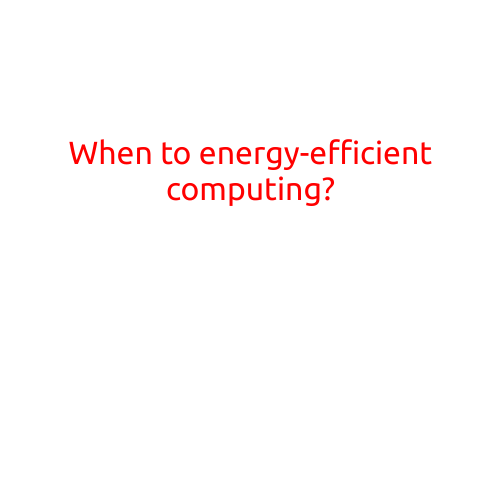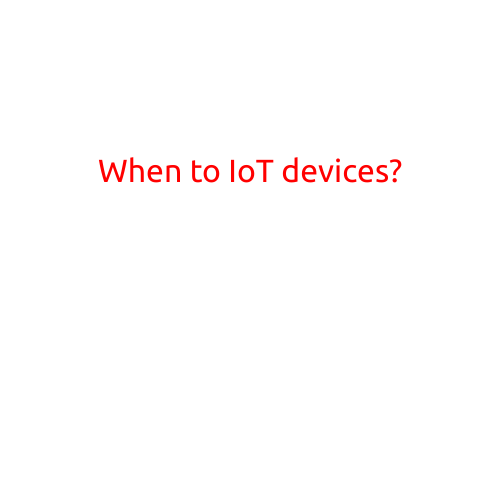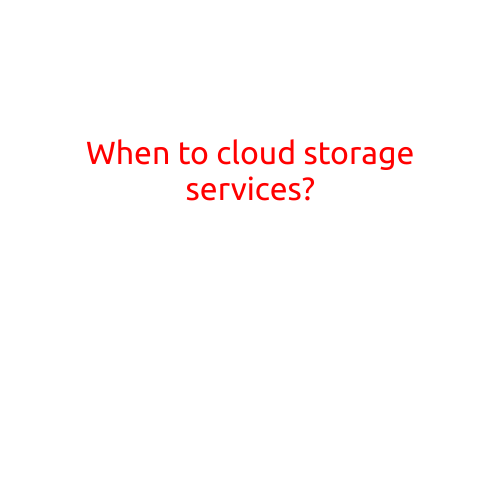
When to Consider Energy-Efficient Computing?
In today’s digital age, computing has become an integral part of our daily lives. From smartphones to laptops, tablets, and data centers, computing devices consume a significant amount of energy. As concerns about climate change, energy consumption, and costs continue to rise, energy-efficient computing has become a vital consideration. But when should you opt for energy-efficient computing? In this article, we’ll explore the benefits of energy-efficient computing and provide guidance on when to make the switch.
Benefits of Energy-Efficient Computing
Energy-efficient computing can bring numerous benefits, including:
- Cost Savings: Energy-efficient devices consume less power, resulting in lower energy bills and reducing your carbon footprint.
- Environmental Impact: By reducing energy consumption, you contribute to a more sustainable future and help combat climate change.
- Increased Productivity: Energy-efficient devices and systems can provide faster processing speeds, enhanced performance, and improved storage capabilities, boosting your overall productivity.
- Reliability: Energy-efficient devices tend to be designed with reliability and durability in mind, reducing the need for frequent replacements and maintenance.
When to Consider Energy-Efficient Computing
So, when should you consider upgrading to energy-efficient computing devices and systems? Here are some scenarios:
- New Purchases: When purchasing a new device, opt for energy-efficient options, such as laptops with EPEAT certification or smartphones with energy-efficient processors.
- Upgrading Existing Devices: If your current devices are nearing the end of their lifespan, consider replacing them with energy-efficient alternatives.
- Data Centers and Servers: If you operate a data center or servers, energy-efficient computing can help reduce energy consumption and costs.
- Business Operations: Companies aiming to minimize their environmental impact and reduce energy expenses should prioritize energy-efficient computing in their operations.
- Specialized Applications: If you require high-performance computing for applications like scientific research, data analytics, or gaming, energy-efficient devices can help you achieve your goals while reducing energy consumption.
- Home Offices: Home workers and remote professionals can benefit from energy-efficient computing, especially if they work with resource-intensive applications or need to maintain multiple devices.
Key Considerations for Energy-Efficient Computing
Before making the switch to energy-efficient computing, keep the following factors in mind:
- Compatibility: Ensure new devices are compatible with your existing infrastructure and software.
- Budget: Energy-efficient devices may be more expensive upfront, but they can save you money in the long run.
- Performance: Energy-efficient devices may have slightly reduced performance capabilities compared to less efficient alternatives.
- Power Supply: Consider the power supply requirements for energy-efficient devices, ensuring you have the necessary infrastructure to support them.
Conclusion
Energy-efficient computing is an essential consideration for individuals, businesses, and organizations alike. By adopting energy-efficient devices and systems, you can reduce energy consumption, costs, and environmental impact while improving productivity and performance. Whether you’re upgrading your home office, data center, or general computing setup, energy-efficient computing is an investment worth exploring. Weigh the benefits, consider the key factors, and make the smart choice for a more sustainable future.





